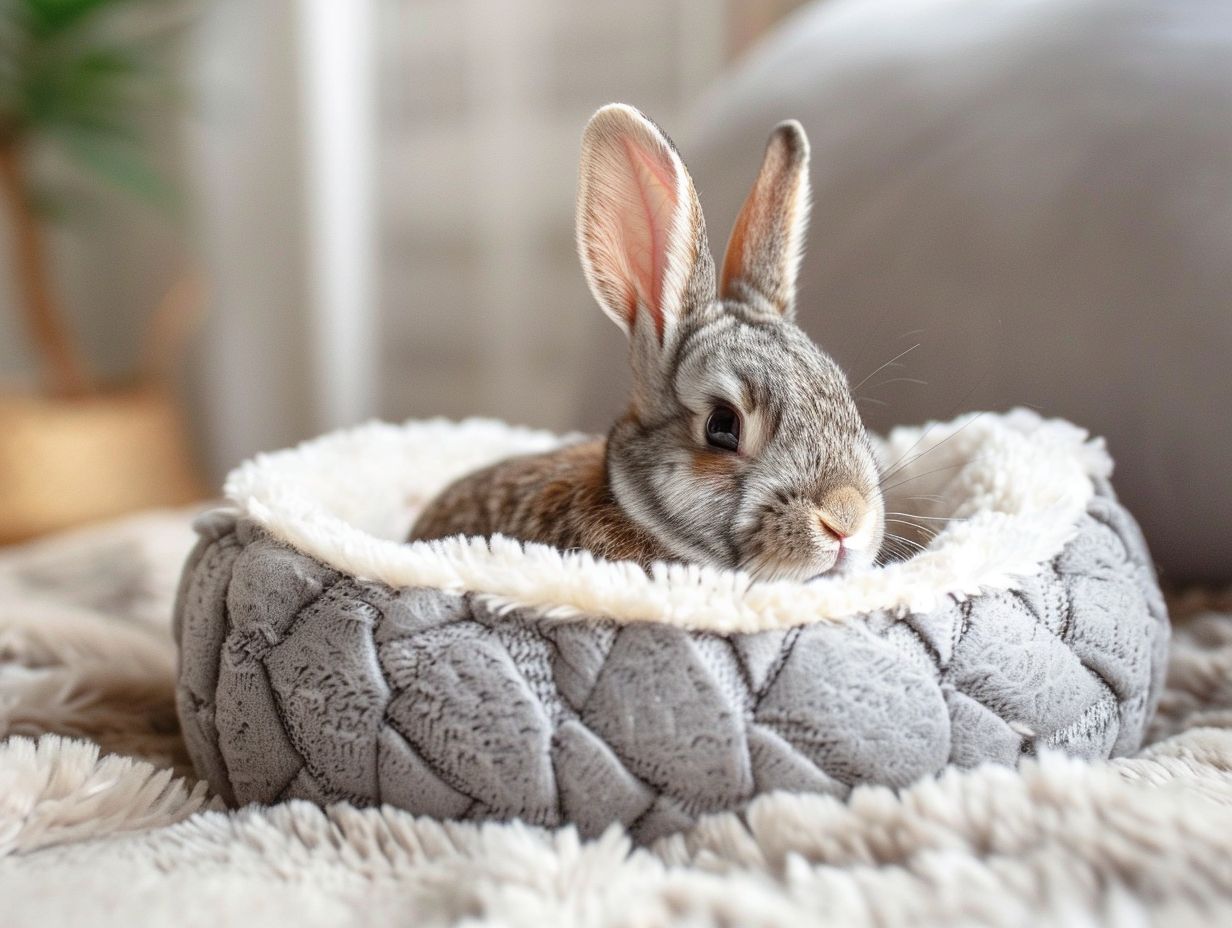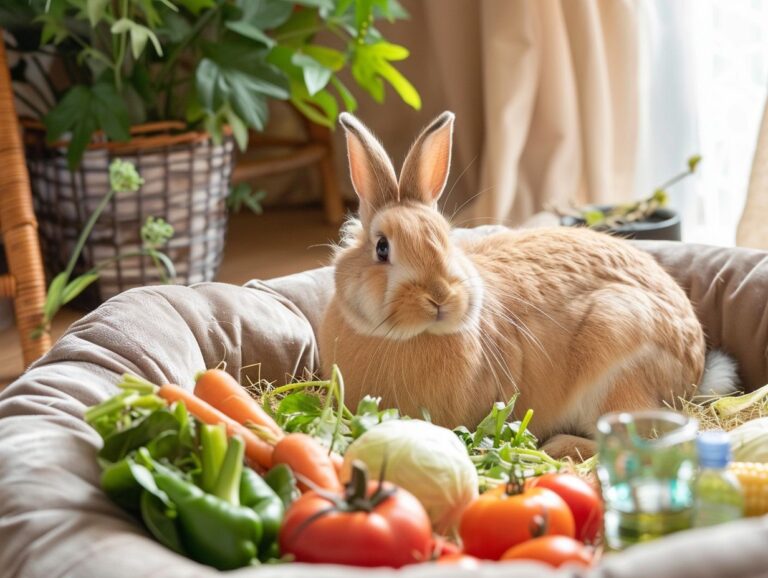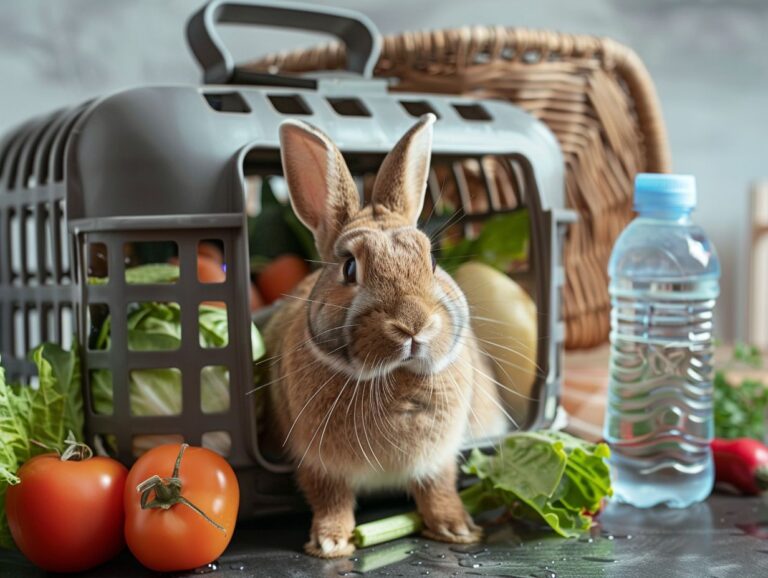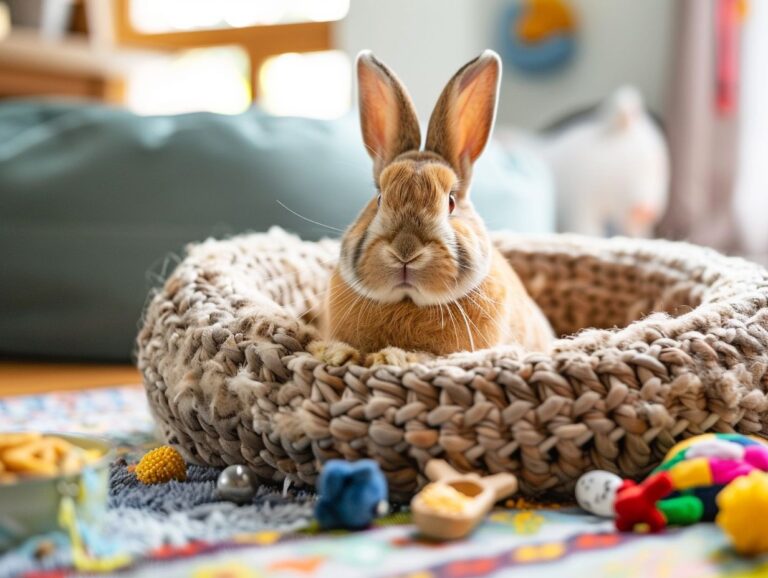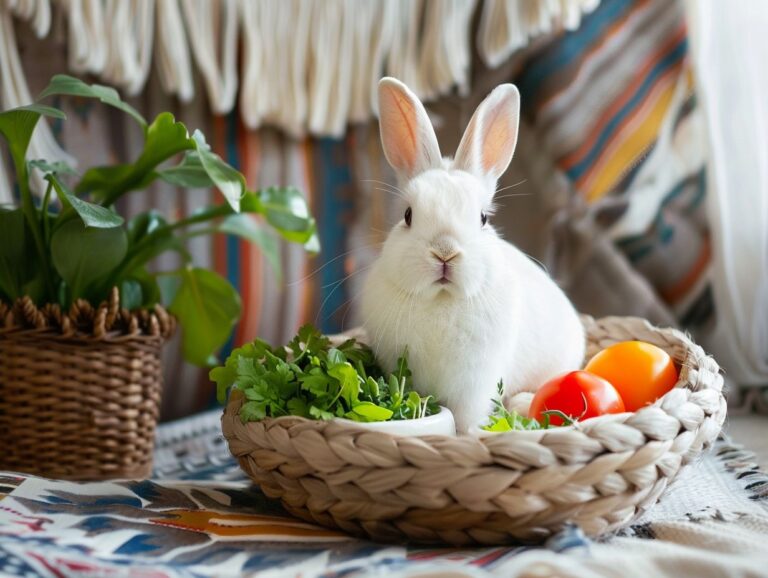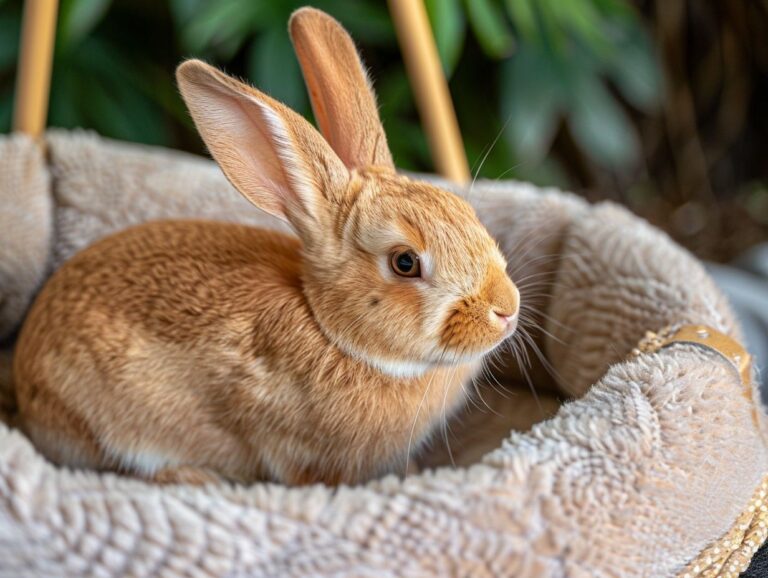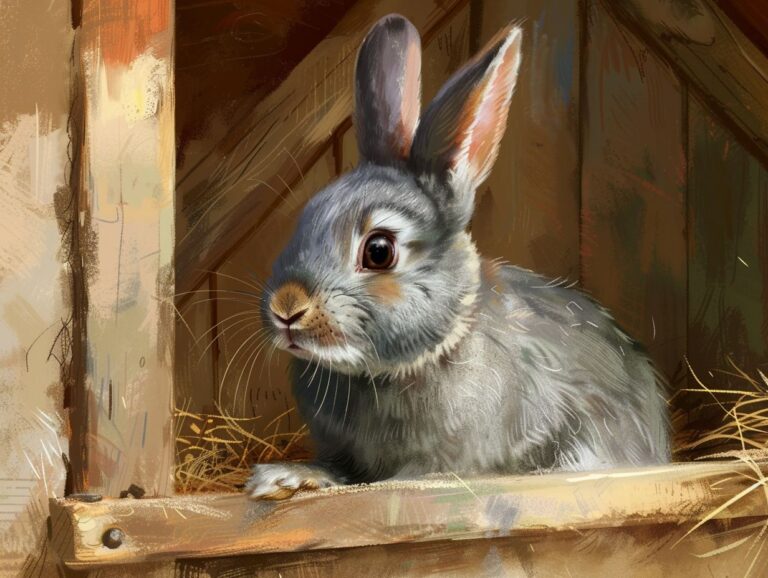Mini Rex Rabbits As Pets: Care, Diet, and Health For Small Breeds
Considering adding a furry friend to your family? Mini Rex rabbits might be the perfect pet for you!
We will explore the characteristics of Mini Rex rabbits, why they are suitable as pets, their ideal diet, common health issues, and tips for bonding with these adorable small-sized breeds.
Whether you’re a seasoned rabbit owner or considering your first pet, this article will provide you with all the information you need to care for your Mini Rex rabbit.
Key Takeaways:
What Are Mini Rex Rabbits?
Mini Rex Rabbits are a popular breed known for their small size, soft fur, and friendly demeanor. They belong to the Oryctolagus cuniculus species and are recognized for their distinct coat texture and colors.
Mini Rex Rabbits were developed in the United States in the 1980s, primarily for their luxurious velvety fur that feels like plush velvet to the touch. This unique feature sets them apart from other rabbit breeds, making them a favorite among rabbit enthusiasts. Their compact size and well-rounded bodies give them a charming appearance that appeals to many pet owners.
What Are the Characteristics of Mini Rex Rabbits?
Mini Rex Rabbits exhibit a docile temperament, making them ideal companions for families and individuals alike. Their social nature allows them to bond well with humans, and they are known to have playful and curious behaviors that contribute to their charming lifestyle.
Mini Rex Rabbits are gentle creatures that not only enjoy social interactions but actively seek out companionship with their human family members. Their inquisitive nature often leads them to explore their surroundings with a sense of curiosity, which can be quite endearing to those who observe them in action. These bunnies thrive on mental stimulation, so providing them with interactive toys and enrichment activities can keep them content and engaged.
In terms of activity levels, Mini Rex Rabbits are surprisingly energetic for their small size. While they do appreciate their moments of relaxation and lounging, they also require regular exercise to maintain good health and ward off boredom. Engaging them in play sessions or allowing them supervised time outdoors can help fulfill their need for physical activity and mental stimulation.
Why Are Mini Rex Rabbits Suitable as Pets?
Mini Rex Rabbits make excellent pets due to their manageable size, friendly demeanor, and adaptability to various living environments. Their low maintenance care requirements and charming personalities make them a popular choice for both new and experienced rabbit owners.
Due to their small size, Mini Rex Rabbits are well-suited to apartment living or homes with limited space. They are known for their affectionate nature and enjoy social interactions with their human companions.
These rabbits require a balanced diet consisting of hay, fresh veggies, and specially formulated pellets to maintain their health and well-being. Their short, velvety fur is easy to groom, requiring minimal upkeep.
What Are the Pros and Cons of Owning a Mini Rex Rabbit?
Owning a Mini Rex Rabbit comes with various advantages and disadvantages. While their affectionate nature and manageable size make them great companions, their specific care needs and potential health issues should also be considered.
Mini Rex Rabbits are known for their friendly and sociable demeanor, often forming strong bonds with their owners. Their compact size makes them ideal for indoor living, requiring minimal space compared to larger rabbit breeds. Their velvety soft fur and distinctive coat colors add to their appeal, making them popular pets for rabbit enthusiasts.
It’s important to note that Mini Rex Rabbits have specific dietary requirements and need a balanced diet of hay, fresh vegetables, and specialized rabbit pellets. Ensuring they receive adequate nutrition is crucial for their overall health and well-being. These rabbits are prone to certain health issues such as dental problems and obesity, which can require regular veterinary check-ups and careful monitoring.
What Is the Ideal Diet for Mini Rex Rabbits?

Hay plays a crucial role in a Mini Rex Rabbit’s diet as it helps maintain their dental health and aids in proper digestion. Pellets are a concentrated source of essential vitamins and minerals necessary for their growth and development. Fresh vegetables, such as dark leafy greens, carrots, and bell peppers, offer a variety of vitamins and antioxidants.
It’s essential to practice proper feeding practices by ensuring a consistent supply of fresh water, limiting sugary treats, and monitoring portion sizes. Portion control is key to preventing obesity and other health issues in Mini Rex Rabbits.
What Foods Should Be Included in a Mini Rex Rabbit’s Diet?
A Mini Rex Rabbit’s diet should include Timothy hay, leafy greens like kale and cilantro, and safe fruits such as apples and strawberries. These foods provide essential vitamins, minerals, and fiber vital for their digestive health and overall well-being.
Timothy hay is a crucial component of a Himalayan rabbits‘ diet as it helps maintain proper dental health and aids in digestion due to its high fiber content.
Leafy greens like kale and cilantro offer valuable nutrients such as vitamin A and vitamin C, which are essential for a rabbit’s immune system and overall health. Consider Rhinelander rabbits as pets for medium-sized breeds.
Safe fruits like apples and strawberries are not only delicious treats for rabbits but also provide important antioxidants and natural sugars in moderation. These fruits add variety to their diet and help prevent boredom, ensuring they stay active and healthy.
What Foods Should Be Avoided for Mini Rex Rabbits?
Certain foods should be avoided in a Mini Rex Rabbit’s diet to prevent digestive issues and health complications. Foods like chocolate, avocado, and high-sugar treats should never be offered to ensure the well-being of these small pets.
Chocolate is extremely harmful to rabbits, as it contains theobromine, which can be toxic to them and lead to severe health problems. Avocado, on the other hand, contains persin, a substance that is toxic to rabbits and can cause digestive disturbances. High-sugar treats like candies and sugary snacks can disrupt a rabbit’s delicate digestive system, leading to issues like obesity and dental problems.
Instead of these harmful foods, include a variety of fresh hay, vegetables like kale, spinach, and carrots, and limited amounts of pellets in your Mini Rex Rabbit’s diet. Hay is essential for their digestive health, while vegetables provide essential nutrients and vitamins. Pellets should be given in moderation to avoid overfeeding and weight gain.
What Are the Common Health Issues for Mini Rex Rabbits?
Mini Rex Rabbits may be susceptible to various health issues such as dental problems, gastrointestinal stasis, and fur mites. Regular veterinary check-ups and monitoring for signs of illness are essential to maintain their health and well-being.
One common health issue in Mini Rex Rabbits is dental problems, which can arise from overgrown teeth that require trimming by a veterinarian. Gastrointestinal stasis, characterized by a decrease in gut motility, is a serious concern for these rabbits. Signs to watch for include reduced appetite, bloating, and fewer droppings.
- Early detection of fur mites is crucial to prevent skin irritation and infections. Regular grooming can help in spotting any signs of these microscopic parasites.
If your Mini Rex Rabbit shows any unusual behavior or physical symptoms, seeking prompt veterinary care is vital to address potential health issues effectively.
What Are the Signs of Illness in Mini Rex Rabbits?
Recognizing signs of illness in Mini Rex Rabbits is crucial for early intervention and treatment. Symptoms like reduced appetite, unusual behaviors, or changes in stool consistency should prompt immediate consultation with a qualified veterinarian to ensure the rabbit’s health.
Keep an eye out for signs of lethargy, nasal discharge, or overgrown teeth, as these could indicate underlying health issues. Any weight loss, fur loss, or difficulty breathing may also signal a problem that requires professional attention. Regular health monitoring through physical examinations and observing their daily habits can help catch any abnormalities early.
How Can You Prevent Health Issues in Mini Rex Rabbits?

In terms of diet, fresh hay should make up the majority of their food, supplemented with leafy green veggies and a small amount of pellets. Proper nutrition is essential for their overall health and digestion.
Grooming Mini Rex Rabbits involves brushing their coat regularly to prevent matting and checking their nails for overgrowth. A clean living space is crucial; ensure their cage is kept dry and clean to prevent any bacterial infections. For more information on Mini Lop rabbit care, visit our comprehensive guide.
Regular health assessments are vital; check for signs of dental issues, watch their weight, and observe changes in behavior or appetite. Early detection can prevent many common health problems in these adorable rabbits.
How Do You Care for Mini Rex Rabbits?
Caring for Mini Rex Rabbits involves providing a spacious and secure enclosure, ensuring regular exercise opportunities, offering mental stimulation through toys and activities, and gentle training sessions to reinforce positive behaviors. Grooming their coat and monitoring their health are essential aspects of their care routine.
Ensuring that Mini Rex Rabbits have a proper living environment is crucial. Their habitat should include a cozy hiding spot, a litter box, and fresh water daily. It’s advisable to line their enclosure with comfortable bedding material, such as hay or straw, and clean it regularly to prevent odors and infections. Creating a safe space will help these curious creatures feel secure and reduce stress.
What Kind of Housing is Suitable for Mini Rex Rabbits?
Mini Rex Rabbits thrive in spacious enclosures that allow them to hop, stretch, and exhibit natural behaviors. Providing hiding spots, platforms for climbing, and opportunities for socialization with human companions contribute to their mental and physical well-being.
Enriching their environment with variety of toys and tunnels keeps Mini Rex Rabbits mentally stimulated, preventing boredom and ensuring their overall happiness. It’s also essential to include cozy bedding for their comfort and a litter box to maintain hygiene within the enclosure.
When setting up their living space, ensure that the enclosure is secure to prevent any escapes and protect them from potential hazards. Rabbit care tips include avoiding wire mesh flooring as it can cause foot injuries; instead, opt for solid flooring or soft bedding.
Creating a peaceful and safe haven for Mini Rex Rabbits plays a significant role in their long-term health and well-being, allowing them to lead a content and fulfilled life.
What Are the Grooming Needs of Mini Rex Rabbits?
Grooming Mini Rex Rabbits involves regular brushing to prevent matting of their dense fur, nail trims to maintain proper length, and occasional baths to keep them clean. Positive reinforcement training can help them feel comfortable during grooming sessions.
Brushing Mini Rex Rabbits should be done at least once a week using a soft brush to remove loose fur and prevent tangles. It’s essential to gently comb through their soft coat, paying extra attention to the underbelly and behind the ears.
In terms of nail care, Silver rabbits care need regular trimming every 4-6 weeks to prevent overgrowth. Use pet nail clippers and be cautious not to cut into the quick, which can cause bleeding and discomfort.
As for bathing, Mini Rex Rabbits should only be bathed on an as-needed basis. Use lukewarm water and a rabbit-safe shampoo, avoiding getting water in their ears to prevent infections. Learn more about Dutch rabbits as pets.
Training your Mini Rex Rabbit for grooming can be a positive experience by associating it with treats and speaking in a soothing tone. Start with short sessions and gradually increase the duration as your rabbit becomes more comfortable with the process.
What Are the Exercise Requirements for Mini Rex Rabbits?
Mini Rex Rabbits benefit from daily exercise to maintain their physical health and mental well-being. Providing opportunities for hopping, exploring, and playing in a safe environment promotes their natural behaviors and prevents boredom or obesity.
One way to ensure that your Mini Rex Rabbit gets enough exercise is by providing them with a suitable play area with tunnels, mazes, and hiding spots to encourage exploration and movement.
-
Interactive toys such as balls, chew toys, and treat puzzles can also stimulate their minds while keeping them active.
-
Having supervised playtime outside of their enclosure allows them to stretch their legs, bask in the sunlight, and experience new sights and smells.
What Are Some Tips for Bonding with Mini Rex Rabbits?

Consistency is key when it comes to developing a deep connection with these delightful creatures. Mini Rex Rabbits thrive on routine, so establishing a daily interaction schedule can significantly strengthen your bond. Additionally,
Encouraging positive behaviors through praise and rewards reinforces their trust in you. Be mindful of their body language – these rabbits are sensitive animals, and understanding their cues will aid in building a harmonious relationship. Socializing them with other household members and gentle pets can also enhance their social skills and overall well-being. For more information on caring for tan rabbits as pets, check out this guide.
##Link: Polish rabbits care for small breeds.
Frequently Asked Questions
What is the average weight for a Mini Rex rabbit?
The average weight for a Mini Rex rabbit is around 2 to 6 pounds, making them a perfect choice for those looking for a small breed of rabbit to keep as a pet.
What are some important factors to consider when caring for a Mini Rex rabbit?
Proper housing, diet, and exercise are essential for the health and well-being of a Mini Rex rabbit. It is important to provide them with a clean and spacious living environment, a balanced diet, and opportunities for regular exercise to keep them happy and healthy.
What type of diet should I feed my Mini Rex rabbit?
A Mini Rex rabbit’s diet should consist of high-quality hay, fresh vegetables, and a small amount of rabbit pellets. It is important to avoid feeding them with sugary treats or human food, as it can cause digestive issues and lead to obesity.
Do Mini Rex rabbits require any special grooming?
Yes, Mini Rex rabbits have a unique fur texture that requires regular grooming. They should be brushed at least once a week to prevent matting and remove loose fur. It is also important to trim their nails regularly and check their ears for any signs of infection.
What are some common health problems to watch out for in Mini Rex rabbits?
Mini Rex rabbits are generally healthy animals, but they may be prone to certain health issues such as ear mites, dental problems, and respiratory infections. It is important to schedule regular check-ups with a veterinarian and keep a close eye on your rabbit’s overall health.
Are Mini Rex rabbits suitable for children?
Yes, Mini Rex rabbits can make great pets for children. However, they require gentle handling and supervision to prevent any accidental injuries. It is important to educate children on how to properly care for and interact with their rabbit to ensure a happy and healthy relationship between them.

